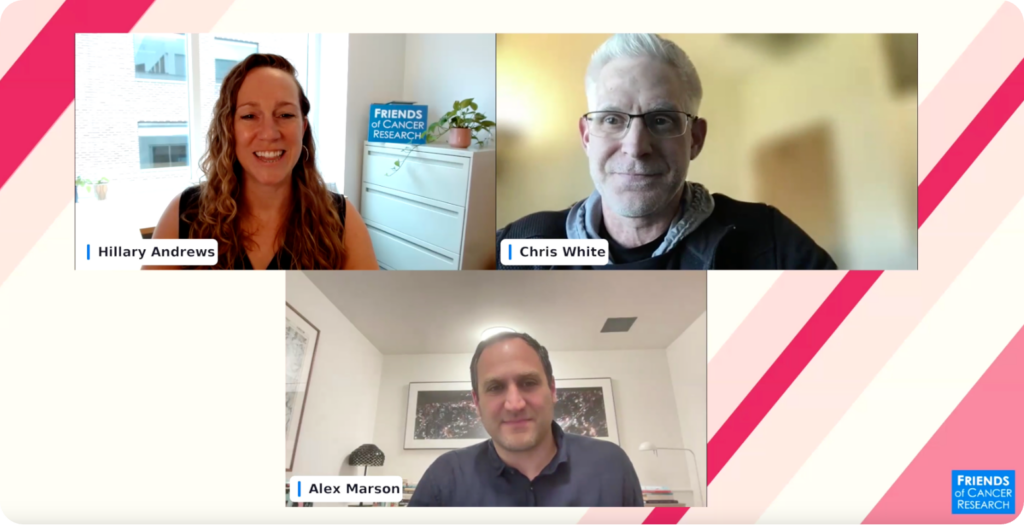
Welcome to Friends’ second Quarterly Advocacy Newsletter of 2024. In Q2, Friends co-hosted a public meeting about cell therapies with the Parker Institute for Cancer Immunotherapy, published several peer-reviewed manuscripts, and launched a webpage for patients and advocates, including a section about our Advisory Advocates. We’re so excited to share these and other happenings at Friends in Q2 with you.
Here’s what you can read more about in this newsletter:
- What’s Happening at Friends?: Read about Friends’ research to ensure diagnostic tests consistently provide reliable results for patients and providers.
- Mark Your Calendars: Upcoming events, including public meetings hosted by Friends and other relevant stakeholders.
- Important News in Cancer Research: Recent news, FDA activities, and policy developments highlighting topics related to Friends’ work and topics impacting cancer care and drug development.
- Did You Know?: Learn more about how our harmonization projects fit into recent proposals for modernized diagnostic regulation.
- In Case You Missed It: Recaps of recent events and links to new publications and content from Friends.
What's Happening at Friends?
Cell and gene therapies are transforming the landscape of cancer treatment; these therapies present new challenges requiring innovative scientific and regulatory frameworks. Friends and Parker Institute for Cancer Immunotherapy (PICI) held a public meeting on May 6th to discuss innovative approaches to developing cellular therapies for cancer. On May 23rd, Friends held a webinar for advocates to unpack the topics covered during the meeting and provide the opportunity to ask further questions.
Chris White, Friends advisory advocate and survivor of mucosal melanoma, shared his perspectives during both meetings. Chris has unique expertise and experience with cell therapies as he participated in a clinical trial of the most recent cell therapy approved by FDA. In our Q&A with Chris, he highlighted why the patient perspective is so critical for advancing the field of cell and gene therapies.
Mark Your Calendars
⬇️ = Reduced Advocate Registration | 🟩 = Free | 🎤= Friends’ Staff Presenting
June 16-20th | Drug Information Association (DIA) Global 2024 Annual Meeting |
| July 19-20th ⬇️ | Best of ASCO Annual Meeting |
September 21-24th ⬇️ | AACR Conference On the Science of Cancer Health Disparities In Racial/Ethnic Minorities and The Medically Underserved |
| November 12th 🎤 🟩 | Friends 2024 Annual Meeting |
Important News in Cancer Research
📰 The News:On April 12th the Oncologic Drugs Advisory Committee (ODAC) unanimously voted that minimal residual disease (MRD) can be reliably used as an endpoint to support accelerated approval of drugs indicated for multiple myeloma. | 💡Why it’s important?: MRD can be measured earlier than traditional clinical trial endpoints (e.g., overall survival) to assess whether a treatment is working in certain hematologic cancers. Data show MRD negativity is linked with prolonged overall survival for patients with multiple myeloma and therefore can be used to “predict” treatment benefit. This can support earlier approvals and provide patients access to promising drugs. treatment benefit. This can support earlier approvals and provide patients access to promising drugs. Friends’ ctMoniTR Project works to build data that supports the use of circulating tumor DNA (ctDNA) as an early endpoint in solid cancers. Friends is using lessons learned from this ODAC meeting to support the approach to evidence generation. |
| 📰The News: On April 23rd, FDA’s final rule for regulation of Laboratory-Developed Tests (LDTs) was published. | 💡Why it’s important?: The FDA’s LDT rule would place LDTs under the same regulatory framework as medical devices. This is important because LDTs are crucial to providing accurate and timely diagnostic results for many conditions, including cancer. The FDA believes that all patients deserve to have access to safe and effective tests regardless of where those tests are made. The LDT rule could provide greater assurances that tests are providing reliable biomarker results for precision oncology treatments. Friends’ HRD Harmonization and Digital PATH Projects generate evidence to identify areas for alignment of tests used in cancer. Improved alignment ensures tests provide consistent, accurate, and reliable information to guide cancer care. |
| 📰The News: On May 22nd, the Pediatric Subcommittee of ODAC met to consider the RACE Act’s impact on pediatric investigations for oncology drugs. | 💡Why it’s important?: Before the RACE Act was implemented in August 2020, orphan drug designation exempted many new oncology drugs from conducting pediatric studies. The RACE Act helped close this loophole and, since its implementation, more drugs with relevant molecular targets have been required to conduct pediatric studies following approval. Read more in Friends’ recent blog post evaluating the RACE Act’s impact. |
Did you know?
In Case You Missed It
Friends published several scientific papers this quarter contributing important insights to various topics in oncology research:
“Genetically engineered cell therapies are emerging as a promising new approach for treating patients with cancer.” said Dr. Jeff Allen, President & CEO of Friends. “This risk-based approach to evaluate the extent to which data from one cellular therapy product can be applied to another has the potential to expedite development.”
Advisory Advocates
Our Advisory Advocates provide critical perspectives to guide our work and inform solutions to drive the field forward for patients. This quarter we created a webpage to highlight their contributions to Friends work and the multitude of other organizations with whom they work. Check out our new webpage for patients and advocates to learn more about Friends’ advocacy opportunities including the Advisory Advocates program and the individuals who make it possible.






